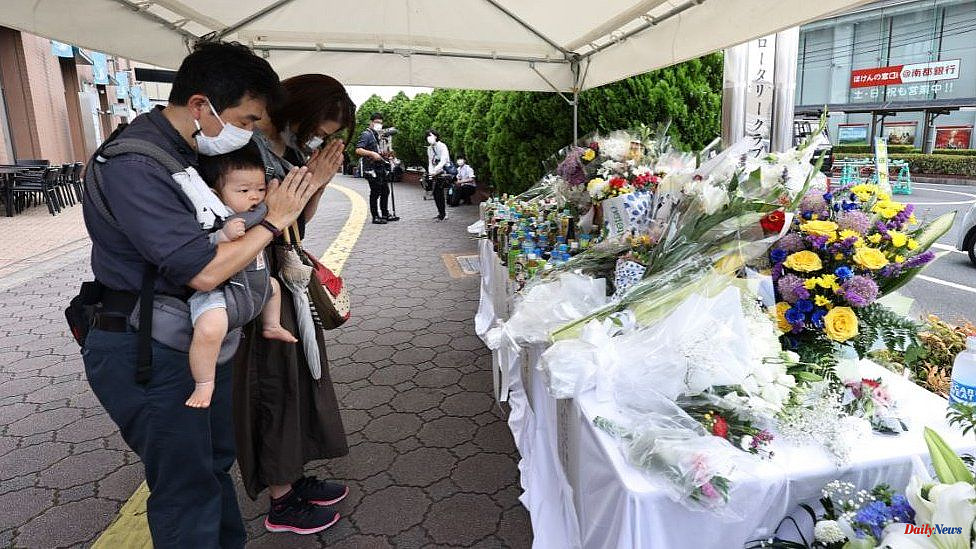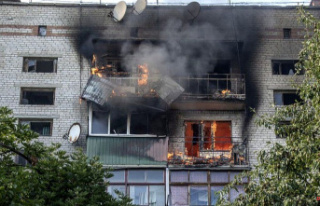Japanese police admit that security measures for Shinzo Abe, the former Japanese Prime Minister, were not perfect. He was killed in Nara on Friday.
"It is undoubtedly that there were security problems," stated Nara police chief Tomoaki Onizuka.
Japan has been shocked by the crime of a gunman opening fire on Abe during a campaign event.
Abe's body was brought by a motorcade to his Tokyo home.
According to police, the suspect was Tetsuya Yamagami (41), who held a grudge against "specific organisations". They said he believed Abe was a part of it.
According to police, Yamagami admitted that he shot him with a homemade firearm.
Police chief Onizuka stated that "the urgent matter is for the us to conduct an investigation to clarify what occurred," but did not specify where he saw failures. Onizuka was near tears when he addressed journalists.
Japanese media quotes sources close to the investigation who claim Yamagami believed Abe was connected to a religious organization that Yamagami claimed had financially destroyed his mother.
Yamagami said that he was a veteran of Japan's navy, the Maritime Self-Defense Force for three years. He had also worked in a factory in western Japan.
Members of the ruling Liberal Democratic Party (LDP) wore black to pay their respects as a hearse carrying Abe arrived at his Tokyo residence.
Local media reports claim that a night vigil is planned for Monday, and Abe's funeral will take place on Tuesday.
Abe, Japan's longest-serving prime minster, died at the age of 67. In the lead-up to Sunday's parliamentary elections, he was campaigning for LDP.
Fumio Kishida (current Prime Minister) is also a member of the LDP and said that he was "simply speechless", vowing to "never give in to violence"
He stated that the election campaign would continue Saturday with tightened security and Sunday's vote will still go ahead.
Japan is a country where gun violence is rare. Handguns are prohibited and instances of political violence are virtually non-existent.
Police are currently investigating the circumstances surrounding Abe's attack and whether his killer was acting alone.
Abe was delivering a speech for a candidate at a road intersection when he was gunned from behind. The suspect was seen standing near Abe just moments before.
Witnesses reported seeing Abe firing two shots from a large gunman who was within a few meters of him. As stunned and disbelieving bystanders, the former prime minister collapsed to the ground.
Security personnel surrounded the gunman and he did not attempt to flee.
The twin-barrelled weapon used to kill Abe was made from metal and wood and wrapped in heavy-duty, black tape.
Later, several other hand-made guns and explosives were found at the suspect’s house.
Abe sustained a neck injury and was bleeding profusely when he was flown to the hospital.
Although he was reported to have been conscious and responsive within minutes of the attack, doctors stated that no vital signs had been detected when he was transferred to hospital.
He was declared dead by medics at 17:03 GMT (08:03 GMT) on Friday.
Many Japanese users expressed their disgust and horror at the incident on Japanese social media.
There were six gun deaths in Japan in 2014, compared with 33,599 in the US. To purchase a gun, you must pass a rigorous exam and undergo mental health testing. Only shotguns or air rifles can be purchased.
Abe was first elected to office in 2006. He then held it for one year from 2006 to 2012, and again from 2020 to 2020. Inciting health reasons, Abe resigned.
He was elected to office and pushed for more assertive foreign policies. He had also long sought to amend Japan’s post-war pacifist constitution.
He also advocated for the economic policy known as Abenomics, which was based on fiscal stimulus, monetary easing and structural reforms.












